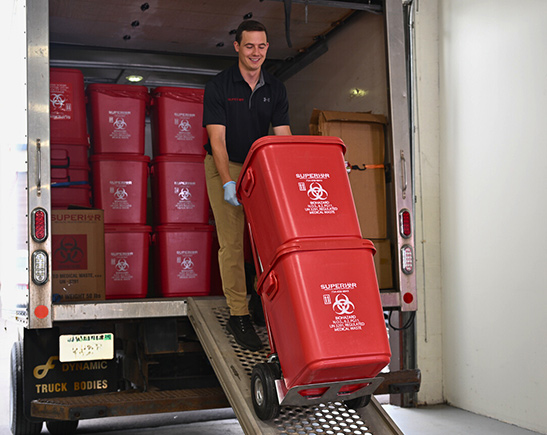Streamlined Solutions: Streamlining Health Care Methods with Specialist Medical Waste Disposal
Streamlined Solutions: Streamlining Health Care Methods with Specialist Medical Waste Disposal
Blog Article
Checking Out Various Waste Disposal Options for a Cleaner Atmosphere
In the pursuit of a cleaner atmosphere, the management of waste disposal has actually arised as a critical prime focus for lasting advancement. With a wide variety of waste disposal options readily available, varying from conventional garbage dump approaches to cutting-edge waste-to-energy technologies, the choice of just how we manage our waste has far-ranging ramifications for our world's well-being. By taking a look at the various techniques and techniques utilized in recycling, composting, incineration, land fill administration, and waste-to-energy processes, a much deeper understanding of their impacts and performance can be gotten. The quest for optimum garbage disposal techniques that prioritize environmental preservation while meeting the needs of an expanding populace stays a pressing worry in today's globe.
Recycling Methods
Applying effective reusing methods is vital in decreasing waste and advertising sustainability in our atmosphere. Reusing entails the process of converting waste materials into multiple-use challenge avoid unneeded disposal. Among the most typical recycling approaches is worldly recuperation, where products like paper, metal, plastic, and glass are accumulated, arranged, and processed to create brand-new items. This process not just preserves all-natural sources however also minimizes power consumption and greenhouse gas exhausts connected with producing brand-new products from the ground up.
Another crucial recycling technique is composting, which entails breaking down natural waste like food scraps and yard trimmings right into nutrient-rich soil. By incorporating these different reusing methods right into our waste administration techniques, we can significantly reduce our ecological footprint and relocate towards a much more sustainable future.

Composting Strategies
Efficient waste monitoring practices, such as reusing techniques, pave the method for a cleaner setting, and now, changing the emphasis to 'Composting Techniques', we explore sustainable methods to disintegrate natural waste for ecological benefit. medical waste disposal.
Composting is an all-natural procedure that changes organic waste, like food scraps and yard trimmings, right into a nutrient-rich soil change. The key to effective composting lies in developing the right equilibrium of eco-friendly products, such as fruit and vegetable scraps, and brownish products, like dried leaves and twigs. These materials decay with the assistance of microbes, breaking down the waste right into beneficial compost.
There are different composting methods readily available to match different needs. Conventional backyard composting involves layering organic materials in a bin or heap and consistently transforming the combination to freshen it. Vermicomposting, on the various other hand, makes use of worms to damage down raw material right into garden compost (click here). For those with restricted area, interior composting systems provide a practical remedy. By utilizing composting strategies, we can reduce the quantity of waste sent out to garbage dumps while creating a helpful item for enriching soil and supporting plant development.
Incineration Cons and pros
Incineration, as a waste disposal approach, provides both advantages and disadvantages that warrant mindful factor to consider in the realm of sustainable waste administration techniques. On the favorable side, incineration can considerably lower the quantity of waste, lessening the need for landfill space and potentially decreasing greenhouse gas exhausts.
Additionally, the high initial investment and functional costs of incineration centers pose economic challenges, making it a much less cost-efficient choice compared to various other waste monitoring methods. Cautious monitoring and guideline are essential to minimize these negative influences and maximize the advantages of incineration as component of a thorough waste management method.
Land Fill Management Techniques
Garbage dumps play an essential duty in waste management and ecological preservation by offering a containment system for the disposal of solid waste materials. Effective garbage dump administration methods are important to alleviate environmental effects and make certain the long-lasting sustainability of these waste disposal sites. One essential approach appertains waste compaction to maximize the use of available room within the landfill (click here). By compacting the waste, the volume is minimized, permitting hop over to here more waste to be fit with time.
Furthermore, the implementation of everyday cover methods is important in minimizing odors, protecting against litter, and decreasing the tourist attraction of parasites. Treatment the disposed waste at the end of every day assists to contain odors and stop potential environmental contamination. In addition, the monitoring of land fill gas emissions and leachate levels is crucial in ensuring that environmental criteria are fulfilled which any kind of potential risks to bordering ecological communities are decreased.

Waste-to-Energy Technologies
Among the innovative techniques to throw away monitoring entails harnessing Waste-to-Energy technologies to convert solid waste into usable energy resources. Waste-to-Energy (WtE) technologies include a series of processes that aim to draw out energy from waste products through thermal, chemical, or biological ways. This conversion procedure not only decreases the volume of waste that ends up in garbage dumps but likewise creates valuable energy sources such as electrical power, warm, or biofuels.
There are a number of techniques of Waste-to-Energy conversion, consisting of pyrolysis, gasification, and incineration. Incineration entails melting waste at heats to produce heat and electricity. Gasification converts waste right into a syngas, which can be utilized for power generation or chemical production. Pyrolysis breaks down organic products making use of heats in the lack of oxygen, creating char, gas, and bio-oil.
Carrying out Waste-to-Energy modern technologies can assist reduce ecological problems related to standard garbage disposal methods while simultaneously providing a renewable power source. Mindful consideration needs to be given to discharges control and making certain the sustainability of feedstock supplies for these modern technologies to be truly useful for a cleaner setting.
.jpg)
Final Thought
Finally, discovering various waste disposal choices such as reusing, composting, incineration, land fill monitoring, and waste-to-energy technologies is vital for advertising a cleaner setting - click here. Each approach has its own benefits and obstacles, however by utilizing a mix of these techniques, we can work towards reducing the amount of waste that winds up in garbage dumps and ultimately add to a much more sustainable future for generations ahead
With a plethora of waste disposal choices offered, varying from conventional land fill approaches to innovative waste-to-energy innovations, the selection of just how we manage our waste has far-ranging effects for our planet's health. medical waste disposal.Incineration, as a waste disposal approach, provides both advantages and drawbacks that warrant mindful factor to consider in the world of lasting waste monitoring techniques.Land fills play an important duty in waste monitoring and environmental conservation by supplying a containment system for the disposal of strong waste products. By condensing the waste, the quantity is lowered, allowing for more waste to be accommodated over time
One of the innovative approaches to waste management involves utilizing Waste-to-Energy technologies to transform solid waste right into usable energy resources.
Report this page